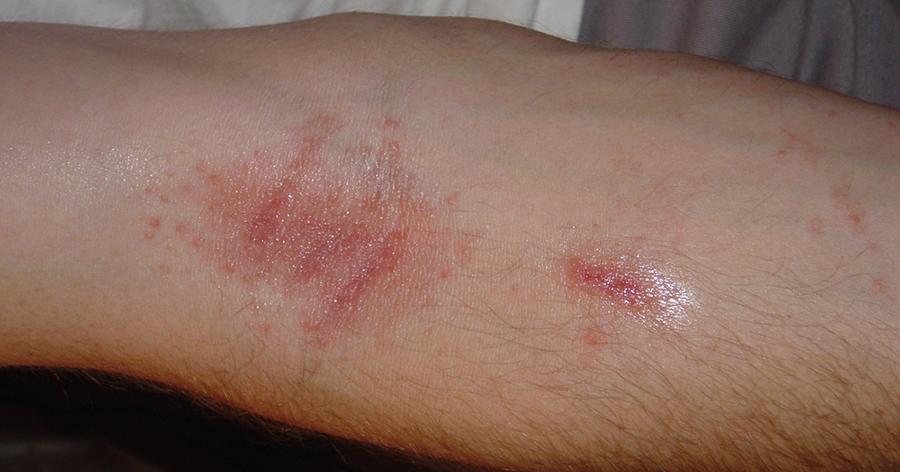Fun in the Sun Can Take a Toll on Skin
Tips for Living with Seasonal Plants, Heat and Insects

As seasonal temperatures rise, people are making plans for getting outside and enjoying warm weather activities like swimming, hiking, golf and camping at the lake. That may be especially true this year as the country seeks a summer of normalcy following 18 months of pandemic restrictions.
When preparing for outdoor recreation, Michelle Tarbox, M.D., a dermatologist for the Texas Tech University Health Sciences Center School of Medicine, said it’s important to be on the lookout for plants, sun exposure and insects.
“As people go back out into the world in the summer months and the warm weather invites us out of our homes, we can come into contact with different things that can cause skin issues,” Tarbox said. “When we're thinking about our skin in the summertime, we want to remember what a big job it has to do for us over the course of a long hot summer.”
To help our skin, and our health make it through the summer months as safely as possible, Tarbox offered some tips to deal with a few of the season’s most common ailments: heat rash, sun poisoning, poison ivy, insects and ticks.
Heat Rash
Tarbox said there are many different types of heat rash. The most common type, known as miliaria, can occur when the openings to the sweat ducts get backed up, prompting moisture to exit the sides of the sweat ducts and causing inflammation in the skin. That in turn can create miliaria rubra, an itchy and uncomfortable condition marked by red bumps around the openings of the sweat glands in the skin.
Tarbox said other types of heat rashes could occur because of an imbalance in our skin flora.
“Small amounts of yeast lives on our skin normally, but it can experience blooms of overgrowth due to the presence of increased moisture from sweating, which can be more of a problem in the warmer months,” Tarbox explained. “This can cause significant discomfort and inflammation because our immune system really does not like yeast. If it sees it, it attacks it very rigorously, so we get a lot of inflammation, a lot of erythema — that's redness — and a lot of pain.”
A yeast rash, which also has a characteristic yeasty smell, can be treated with over-the-counter anti- yeast medicines. If the rash fails to improve with treatment, or if it worsens, Tarbox advised seeking medical attention from your primary care physician or dermatologist.
Sun Poisoning
More than simply a really bad sunburn, sun poisoning can make it difficult for the body to regulate temperature, which can lead to significant internal symptoms and issues with blood pressure and heart rate.
Tarbox said sun poisoning is an often-urgent condition commonly marked by feeling lightheaded and weak that can strike if you've been out in the sun for an extended period of time and have become dehydrated. When that happens, the person should be taken somewhere cool where they can begin rehydrating themselves. Patients experiencing sun poisoning also may develop headaches, chills and nausea.
“Also pay attention to how you feel, because after somebody gets a little bit more exposure to the sun, they can progress to something called a sun stroke, which can be quite catastrophic,” Tarbox cautioned. “Symptoms of sun stroke occur when the body overheats to the point that it can no longer regulate its own temperature. Dizziness and confusion are symptoms that may indicate a sun stroke, which is also called a heat stroke or heat exhaustion.”
Tarbox said the best way to avoid sun poisoning is to be sun smart.
“You have to think about how much time you're spending in the sun, especially if it's direct sunlight,” she stressed. “You'd have to think about ways you can protect yourself from those high temperatures and UV radiation. I like to think about my sun care protection as a football team, where my sunscreen is the quarterback, but he can't do the whole job by himself.”
To add protection, Tarbox suggested incorporating some protective clothing such as hats and long sleeves with breathable fabric. Other preventative steps include avoiding the sun from the most peak hours of sun exposure — that's usually 10 a.m. to 2 p.m. — and thinking about seeking shade during those times.
“You also want to make sure that you're very well hydrated when you're out in the sun because you will be sweating to help keep yourself cool,” Tarbox said. “You're losing water faster than you think you are, and dehydration worsens all the symptoms of sun poisoning and sun toxicity.”
Poison Ivy
Approximately 80% of people exposed to the leaves of the poison ivy plant will develop its signature rash, and while poison ivy is not as much of an issue in West Texas as in other parts of the state, Tarbox said there is a little known risk for people when they purchase plants from a nursery: those plants may have been grown in an area that has endemic poison ivy and then shipped to other areas for sale. A few sprigs of the poison ivy plant that could still cause a rash may be present at the base of some of those migrant plants.

“Recently, we've discovered that poison ivy is becoming more populous because of increasing temperatures, and there also is evidence that the toxic oil called urushiol that's in the leaves and causes the rash of poison ivy is increasing in concentration,” Tarbox added.
That means exposure to poison ivy may produce a more significant rash than it did previously. Poison ivy’s rash is a type of allergic dermatitis that most often appears as small blisters that are extremely itchy.
Because the urushiol oils that cause the rash can be easily spread, even underneath the fingernails, Tarbox recommends thoroughly cleaning the hands and other areas of the body that may have been exposed to plant.
“There's actually soap called Ivy Block or IvyX that can help make sure that you get all the little last traces of that oil out from under your fingertips so that you're not inadvertently putting it into more places,” Tarbox said.
For milder cases, Tarbox said topical steroids and antihistamines to help relieve the itch are often effective, and some patients get comfort from Calamine lotion or oatmeal baths. If it's a relatively significant case, the patient may require a treatment with systemic steroids like prednisone. For those not among the estimated lucky 20% who are free from the effects of poison ivy, Tarbox said it’s best to recall an old saying about the plant: if there are leaves of three, let it be. The leaves also often appear to be shiny or waxy due to the presence of urushiol oil on the leaves, though these characteristics may be absent if there has been recent rainfall.
Insect Bites
Insect bites, one of the most annoying summertime scourges, is often the price of admission for us enjoying the great outdoors. However, Tarbox said there are several smart moves one can make to minimize exposure to insects: use appropriate pesticides for your age and medical condition and wear protective clothing. In fact, Tarbox pointed out, there are some protective clothes that actually have pesticide in the fabric.
“There's a nice line that's called ExOfficio that has Insect Shield, which is actually a kind of nice insect repellent that's a part of the clothing,” Tarbox said. “They are very helpful and protective because the more skin that's exposed, the more likely you are to get bitten or stung.”
Tarbox said it’s also wise to avoid places where insects may be drawn such as tall unruly grassy areas, areas of standing water and places where there's brush and foliage with which you're not familiar.
Ticks
When it comes to bug bites, Tarbox said ticks can transmit several relatively significant and serious diseases, including Lyme disease, which is caused by a small bacterium that lives in the tick. When the tick bites us, it gives that bacterium to us as a little gift that can make us very sick.
To protect oneself from tick bites, Tarbox suggested wearing long pants and applying the appropriate insect repellent. In fact, she added, many people will tuck their pants into the socks if they're in an area where ticks are populous.
“After a long day of hiking or being out in nature, it's also good idea to do a tick check where a buddy checks you to make sure that there's no ticks on your skin that you are unaware of,” Tarbox continued. “Believe it or not, those little critters have an anesthetic substance in their saliva so that when they bite us, we don't feel it, so if it's not in a place you can see you might not discover the tick for a while.”
The good news, Tarbox said, is that ticks have to be on your body for an extended period of time to transmit that little bacterium that makes us sick.
“If you can get them off relatively quickly, you might not have to have the antibiotic prophylaxis (doxycycline) for the conditions that can be transmitted by a tick bite,” she said.
There are many warm-weather conditions that can negatively impact our skin health during the summer months, but Tarbox believes that with a bit of prevention, we can make it through to the fall mostly unharmed by the summer sun.
“Our skin has to keep us cool, protect us from the environment and basically get us from June to August without too much difficulty,” Tarbox concluded. “We want to protect it from the sun, we want to cleanse it gently and we want to restore moisture to it after a long day out at the beach.”
Related Stories
Celebrating Veterans: TTUHSC’s General Martin Clay’s Legacy of Service and Leadership
From his initial enlistment in the Army National Guard 36 years ago to his leadership in military and civilian health care management roles, Major General Martin Clay’s career has been shaped by adaptability, mission focus and service to others.
Texas Tech University Health Sciences Center School of Nursing Named Best Accelerated Bachelor of Science in Nursing Program in Texas
The TTUHSC School of Nursing Accelerated Bachelor of Science in Nursing (BSN) program has been ranked the No. 1 accelerated nursing program in Texas by RegisteredNursing.org.
TTUHSC Names New Regional Dean for the School of Nursing
Louise Rice, DNP, RN, has been named regional dean of the TTUHSC School of Nursing on the Amarillo campus.
Recent Stories
The John Wayne Cancer Foundation Surgical Oncology Fellowship Program at Texas Tech University Health Sciences Center Announced
TTUHSC is collaborating with the John Wayne Cancer Foundation and has established the Big Cure Endowment, which supports the university’s efforts to reduce cancer incidence and increase survivability of people in rural and underserved areas.
TTUHSC Receives $1 Million Gift from Amarillo National Bank to Expand and Enhance Pediatric Care in the Panhandle
TTUHSC School of Medicine leaders accepted a $1 million philanthropic gift from Amarillo National Bank on Tuesday (Feb. 10), marking a transformational investment in pediatric care for the Texas Panhandle.
Texas Tech University Health Sciences Center Permian Basin Announces Pediatric Residency Program Gift
TTUHSC Permian Basin, along with the Permian Strategic Partnership and the Scharbauer Foundation, Feb. 5 announced a gift that will fund a new pediatric residency.
